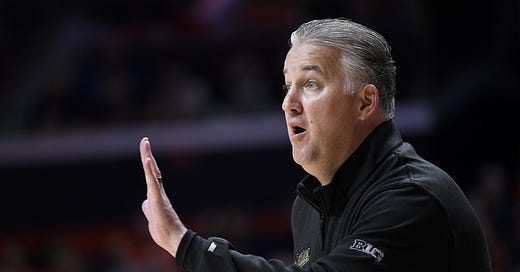These Are the Coaches to Avoid in the Men’s NCAA Tournament
If we think track record versus expectations matters, these coaches have failed as high seeds before.

Conference tournament week is upon us in men’s college basketball, and that means thinking about the big picture of the brackets ahead of Selection Sunday. Since coaches matter so much as a part of that process, I wanted to look at the track records of the people patrolling the sidelines for this year’s likely top seeds.
Based on the most likely teams to be seeded in the top half of their region, per BracketMatrix, there are actually quite a few favorites in 2024 that will be guided by coaches with a track record of March Madness letdowns. We can see this when we pair up BracketMatrix’s seed projections with Bart Torvik’s excellent tourney stats for coaches.
Specifically, Torvik has a stat called Performance Against Seed Expectations (PASE), which looks at how far a coach got in each tourney they coached, relative to how far the average team at their seed number tends to get. Since 2000, the great Tom Izzo is the career leader, and it’s not especially close; his Michigan State teams have won 15.4 more games than they “should” have based on where they were seeded. At the opposite end of the spectrum, Virginia’s Tony Bennett is the worst coach versus expectations, winning 7.7 fewer games than we’d expect based on his seedings.
Izzo and the Spartans may get a chance to add to that this season, as they are in line for a 9-seed in spite of a pretty disappointing regular season for a team that was ranked 4th in the preseason poll. Bennett’s Cavaliers probably won’t have much in the way of expectations to squander this time around; they’re tracking for an 11-seed, if they make the tourney field at all.
But how about the coaches that are leading projected top teams? Here are the lowest lifetime PASE numbers (since 2000) for coaches whose teams were in line for an 8-seed or better as of Sunday, March 10:
More of this year’s projected top-8 seeds are led by coaches with negative PASE numbers than positive, which sets up an interesting dilemma for bracket-fillers.
Take the expected 1-seeds, for instance. While Danny Hurley looks good after leading UConn to maybe the most dominant title run in modern NCAA tournament history, Houston’s Kelvin Sampson is slightly below break-even in PASE — and that’s actually pretty good by the standards of Purdue’s Matt Painter and Tennessee’s Rick Barnes. Both coaches will potentially go into the tournament leading 1-seeds while carrying some of the worst PASE baggage of any coaches since 2000. (Barnes ranks 408th out of 415 coaches, and Painter ranks 409th.)
Peruse the list further, and the likely 2-seed coaches are little better. UNC’s Hubert Davis has a good mark based on the national title-game run he led in 2022, though that’s the only tourney sample he offers. (Somehow UNC missed the tournament last season, despite ranking No. 1 in preseason.) Iowa State’s T.J. Otzelberger took the Cyclones to the Sweet 16 in 2022, his lone deep run, while Shaka Smart (Marquette) and Tommy Lloyd (Arizona) have a demonstrated history of tourney letdowns.1 And among teams in line for seeds 3-5, we have some more historically offending coaches — such as Illinois’ Brad Underwood, Kansas’ Bill Self, Alabama’s Nate Oats, Clemson’s Brad Brownell and Mark Pope of BYU.
(At the opposite end of the ranking, would it surprise anyone to see Kentucky — who’s tracking for a No. 4 seed — continue John Calipari’s trend of outperforming seed expectations throughout his career?)
So how predictive is all of this? For those coaches with small samples feeding their PASE numbers, I’m willing to give some leeway. Any coach can have a disappointing tournament early in their careers with major schools (or other favorites). However, I do think there is at least some merit to thinking about this stuff when pondering your bracket. (As someone who has picked enough Bill Self and Rick Barnes teams to know better, I am speaking from experience here.)
Of course, this year could offer so many higher-seeded teams led by so many disappointing coaches that some of them will probably slip through and improve their PASE numbers practically by default. But in that case, which coaches with bad track records should you back? That’s a question everyone will have to answer for themselves next week.
Filed under: College basketball
That might be a bit unfair to Lloyd, who guided Arizona to the Sweet 16 from in 2022… but they were a 1-seed (and lost to a 5 in that round), and he is punished further by this metric for losing as a 2-seed to No.15 Princeton last year. As for Smart, he has won only 3 tourney games in 9 NCAA appearances since leading VCU to the Final Four in 2011.




